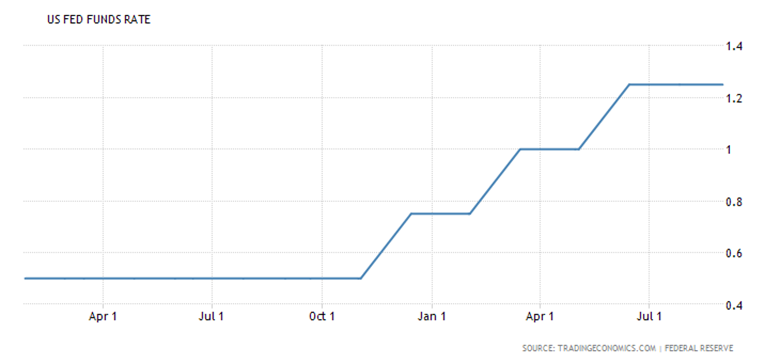How Will We Be Affected by a Series of Rate Hikes?
Interest-Rates / US Interest Rates Sep 23, 2017 - 12:42 PM GMTBy: Boris_Dzhingarov
 The current federal funds rate is 1.00% – 1.25%. The Fed started raising interest rates in December 2015, when they were at a historic low of 0.25%. Since then, 4 rate hikes have been implemented, each valued at 25-basis points. Today, the federal funds rate (FFR) is inching towards the 1.25% – 1.50% level. The average interest rate in the US between 1971 and 2017 was 5.77%. It peaked at 20% in 1980 and dropped to an all-time low of 0.25% after the global financial crisis of 2008. Interest rates are especially important when it comes to monetary policy.
The current federal funds rate is 1.00% – 1.25%. The Fed started raising interest rates in December 2015, when they were at a historic low of 0.25%. Since then, 4 rate hikes have been implemented, each valued at 25-basis points. Today, the federal funds rate (FFR) is inching towards the 1.25% – 1.50% level. The average interest rate in the US between 1971 and 2017 was 5.77%. It peaked at 20% in 1980 and dropped to an all-time low of 0.25% after the global financial crisis of 2008. Interest rates are especially important when it comes to monetary policy.

In fact, it is the primary tool available to the Federal Reserve Bank (FRB) to manage the money supply. Broadly speaking, an interest rate hike increases the cost of borrowed money, making it less likely that people will finance big-ticket items through lines of credit. Increases to the FFR also raise revenues for banks, financial institutions, and credit card companies. In times of monetary tightening (rate hikes and reductions to asset purchases) the USD tends to appreciate relative to other currencies.
Interest Rates and the USD
The reason the greenback appreciates when interest rates rise is that it becomes relatively more desirable to hold US dollars compared to British pounds, Japanese Yen, Euros and the like. However, rising interest rates are a double-edged sword. On the one hand, a stronger USD may give the impression of being positive for the economy. US equities markets typically rally when the Fed raises rates – not because they favour high interest rates, but because it indicates the Fed perceives the economy positively. When unemployment levels are dropping (less people out of work) and the inflation rate is reaching the 2% objective, the Fed will pull the trigger on interest rates.
From the Fed’s perspective, the decision to raise interest rates is reflective of a strongly performing US economy. Equities markets enjoy bullish signals, and rise accordingly. However, the medium to long-term prognosis for rising interest rates is not necessarily bullish for equities markets. Consider that many of the listed companies are indebted to banks, credit card companies and lenders to the tune of hundreds of billions of dollars. When interest rates rise, the burden placed on these companies increases accordingly.
Companies Pass on the Costs to Consumers
Higher rates squeeze profitability, unless these companies can pass the costs on to consumers in the form of higher prices. This feeds into rising inflation rates. As you can imagine, the constant give-and-take, appreciation and depreciation results in a series of contractions and expansions in equities markets, commodities markets, currency markets, and indices markets. The more pressing concern is how rising interest rates will affect Main Street. US households are faced with burgeoning debt levels. With falling real wages and rising inflation, personal disposable income levels are stretched tight.
According to the latest figures, household debt is now at its highest level in history, including the following components:
- Student Loan Debt is $1.3 trillion +
- Credit Card Debt now tops $1 trillion +
- Automobile Loan Debt is now $1.2 trillion +
- Mortgage debt is now $8.7 trillion +
These figures are cause for concern. This is especially true of unsecured debts like credit card debt which comes with high APR’s (annual percentage rates) which fluctuate according to the federal funds rate. In other words, as the FFR increases, the APR on unsecured debts like credit cards rise accordingly. According to Trade-24 expert, Edgar Martin – ‘We face a pretty precarious predicament in the workforce today. The average US household is now living from paycheck to paycheck. This statistic has worsened year on year, from 75% in 2016 to 78% in 2017. And it doesn’t matter what sort of income levels we’re talking about – this is a phenomenon across the board.’
If the Fed decides to raise rates in December (December 13, 2017), the 25-basis point increase will raise the cost of capital, and increase the interest-related component on borrowed money. A strong USD is a disincentive to foreign buyers of US products, but it makes imports into the US much cheaper. The absence of a policy decision without externalities is problematic, but economic forecasts indicate that rate hikes are coming.
By Boris Dzhingarov
© 2017 Copyright Boris Dzhingarov - All Rights Reserved
Disclaimer: The above is a matter of opinion provided for general information purposes only and is not intended as investment advice. Information and analysis above are derived from sources and utilising methods believed to be reliable, but we cannot accept responsibility for any losses you may incur as a result of this analysis. Individuals should consult with their personal financial advisors.
© 2005-2022 http://www.MarketOracle.co.uk - The Market Oracle is a FREE Daily Financial Markets Analysis & Forecasting online publication.



